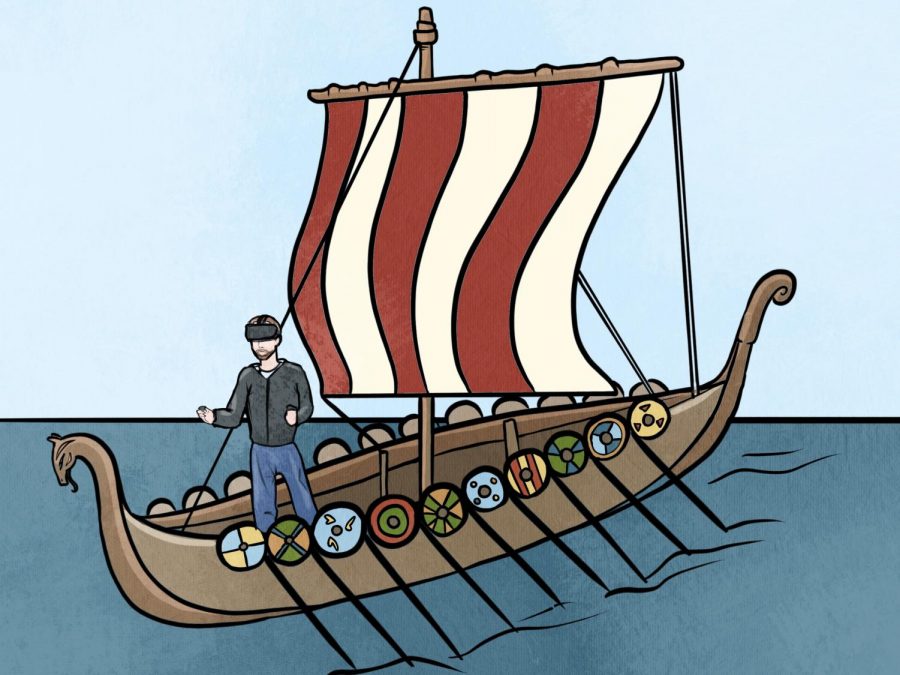David Neville sets sail on virtual Viking longship project
Illustration of a man wearing a virtual reality headset on a Viking longship.
February 13, 2023
The National Endowment of the Humanities has awarded David Neville, digital liberal arts specialist, along with a team of faculty and students a grant of $46,136 to create a virtual-reality (VR) Viking longship as an original, interwoven technology learning pursuit. Neville’s “The Virtual Viking Longship Project” will not only create a VR learning space to replicate elements from the Viking era, including a longship and a mead hall, but will also introduce the concept of a new immersive learning method into academia .
“We can produce things at the College and put it out there for people to use — other institutions, high schools, junior highs,” said Neville. “This is a way for us to amplify and project our voices and our ideals out into the world.”
Neville’s interest in the Viking Age, a period that spanned from 793 to 1066 C.E. and reached from North America to the Middle East, began early when he made Viking armor for picture day in kindergarten. Drawn to the medieval period throughout his academic career, he received his Ph.D. in German language and literature from Washington University with concentrations in medieval studies and Latin language and literature.
The technical side of learning has also always interested Neville. “I like technology because it lets me ask the ‘what if’ questions,” said Neville. He notes that it allows him to push the envelope and try new things.
After applying for other various grants since 2012, Neville began working on building the longship project specifically during COVID-19 lockdown. He began by taking actual drawings and measurements of Viking constructions, creating a 3D model on his laptop with Blender and the Unity game engine. He and his creating team first submitted to this grant in 2021 and were awarded in January of this year.
Neville’s collaborators include Tim Arner, associate dean of curriculum and academic programs and associate professor of English, Vanessa Preast, associate director of the Center of Teaching, Learning and Assessment and Austin Mason, director of the digital arts and humanities program at Carleton College.
Arner says he is the subject matter expert, as his area of research is in medieval literature. As the team links historical and literary pasts, he speaks on the gaps that come in dealing with Viking history.
“Work as a medievalist has made me comfortable with working in somewhat imagined spaces based very much in the history record,” Arner said. “I’m excited for what this [the project] means in terms of our connection to other institutions, but also in terms of a teaching tool and the public humanities project. It makes these long-lost spaces, all of a sudden, really accessible.”
According to both Neville and Arner, one reason for this project’s focus is to correct misconceptions that people have regarding the medieval age, whether that comes from incorrect movie portrayals or current appropriations of Viking symbols to fit white supremacist narratives.
“One thing that I think is really important is investing in the global Middle Ages and in thinking and understanding the Vikings as being part of a global network of trade and cultural exchange,” said Arner.
Arner and Neville added that the team is looking for students to collaborate on this project as a Mentored Advanced Project (MAP) for the summer of 2023, and they ask those interested in digital art, 3D modeling, Viking and medieval studies, history and literature, human-computer interaction or similar subjects to contact [arnertim] and [nevilled].
Vanessa Preast serves as an advisor on the assessment piece, especially when students become more involved in what will be a MAP process over the summer. Preast highlighted the importance of the project as a collaboration: “Being able to bring in people with very different areas and all working towards a common goal. That gets me excited,” Preast said.
The team will collaborate with institutions around the world, including research in Denmark and Iceland, a Viking society in Minnesota, a museum in Germany and the Gokstad ship from Norway in 840 C.E.
“Without the longship there would be no Viking Age as we understand it,” said Neville. He and his team say that the Virtual Viking Longship Project will bring into the academic conversation a new element that combines learning and technology.
“Every little bit helps,” said Neville. “If we put something out there that helps educate people, then I think that’s making the world a little bit of a better place.”


















































